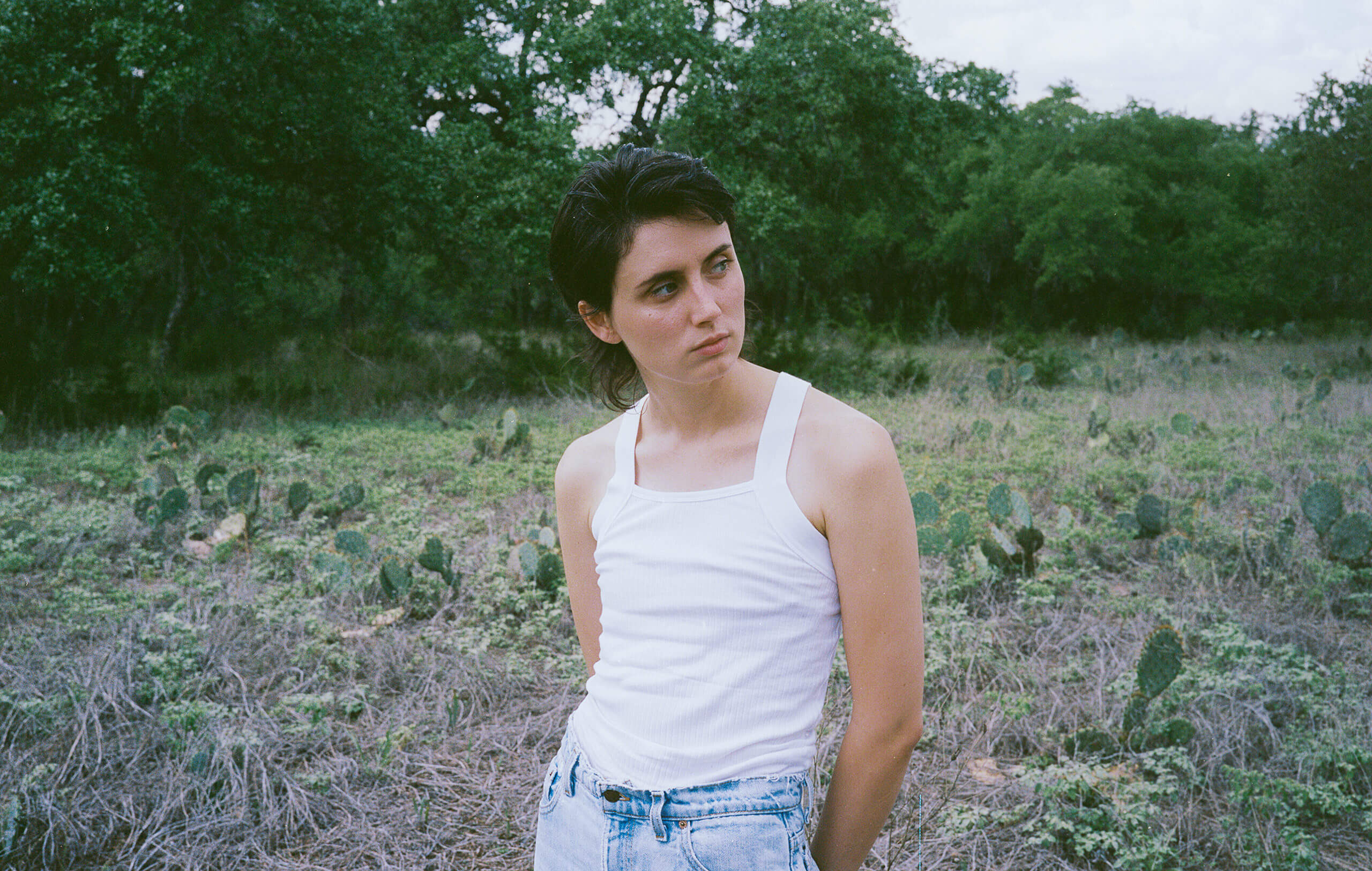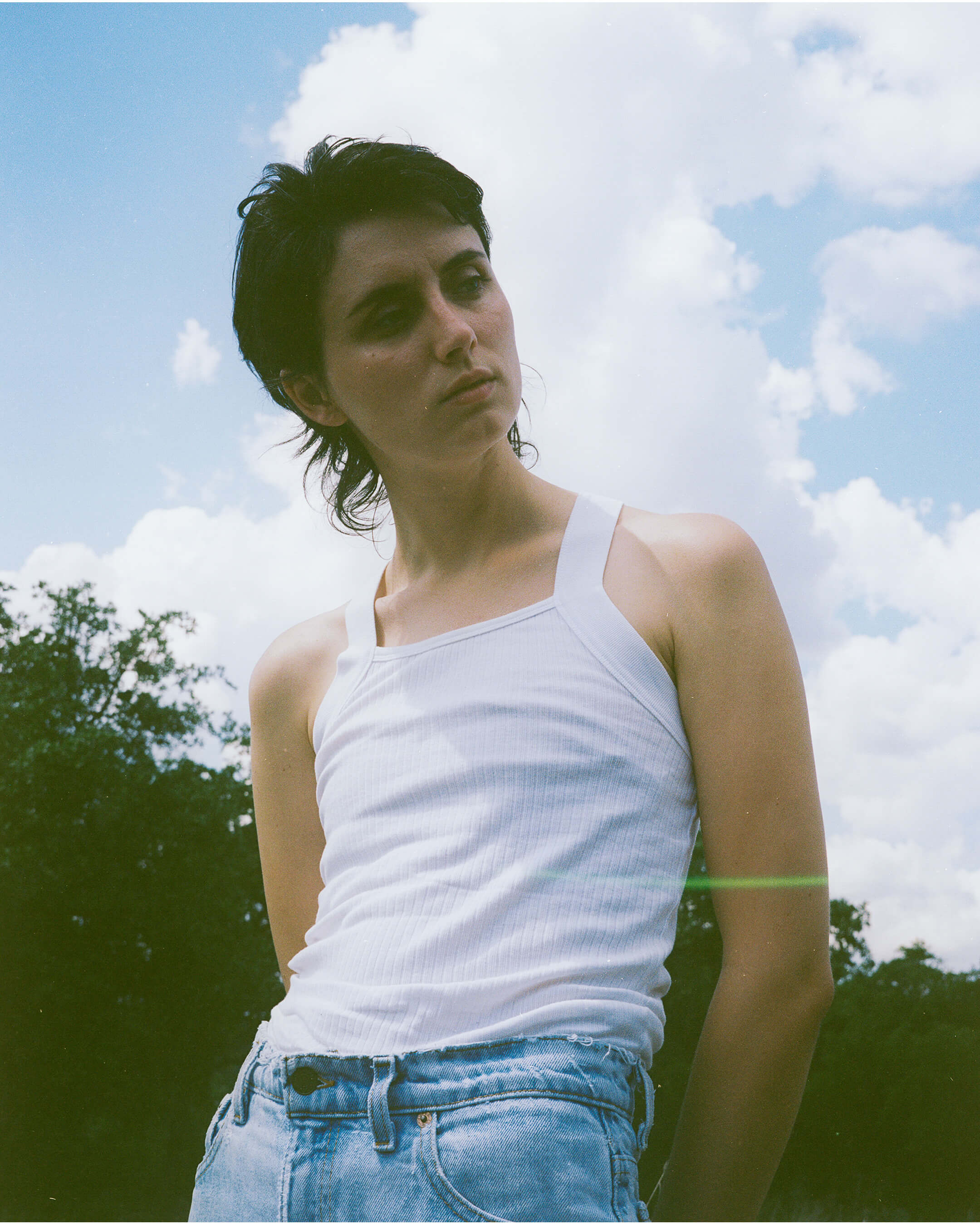Introducing… Katy Kirby, the Texan songwriter approaching indie-rock with a clean slate
Kirby’s evangelical Christian upbringing meant she grew up without many of the pop touchstones the rest of us take for granted, but it also means the guitarist’s debut album comes from a place unburdened by its baggage.

Image: Jackie Lee Young
Some songs just feel like they’ve been around forever. A lot of that comes down to eliciting an emotional response beyond the basics of a pleasant hook or insistent beat – from first listen they have you and they won’t let go. That feeling, intense and addictive, is so vivid that it can sometimes lead us to file brand new music alongside childhood favourites. It’s not an easy thing to achieve, and it’s even more difficult to hang around once the rush wears off.
Katy Kirby’s songs feel like they’ve been around forever. Her debut LP Cool Dry Place is home to nine of them – all different from one another, all keepers. Some of the early heavy lifting is done by a sense of familiarity, with her music inhabiting a similar space to other immaculate indie-pop records by bands like Big Thief, Hop Along or Wye Oak, but its staying power comes from an approach to melody that foregrounds patterns and subtle about-faces over verse-chorus-verse. “As I’ve gotten a bit older, and less inclined to make things that feel like folk songs, structure has definitely gotten less important to me,” Kirby says over Zoom, ringed by sunlight from an adjacent window.
Kirby’s writing is informed by a very specific set of circumstances. She grew up in Spicewood, Texas, a little under 40 miles outside of Austin, and was homeschooled in an evangelical Christian household. Her father loved barbershop quartets and taught her how to harmonise, while she came to understand the singalong mechanics of worship music in the space that other kids reserve for learning the rock ‘n’ roll ropes through the record collections of their folks and older siblings.
“My parents are unbelievably innocent of most music that was going on while they were young,” she says. “They weren’t really engaged with that. I wasn’t really exposed to classic rock, nor jazz or anything like that. It was mostly worship music that’s particular to evangelical America in the 90s and early 2000s. It was the music primarily of this one sect of the evangelical church called the Vineyard, who did put out a lot of records in the 90s, and I think founded a particular type of style, or a particular type of modern-ness, sort of like a pre-Hillsong Hillsong.
“They’re meant to be sung by a lot of people, so the people who are writing those songs are very interested in them being easy to grab on to quickly. They’re still beautiful songs and melodies, but there is a simplicity built into them that it seems like I’ve internalised. I can only imagine I have. There were a handful of Christian songwriters who were very lyric-heavy that I remember being exposed to, like Andrew Peterson, this very clever, dense writer. I think him, and Amy Grant, and all these other people who are vivid and traditionally structured songwriters, was what I was exposed to. Nothing was experimental or impressionistic, but it was very well written and tightly constructed.”
Ebbs & flows
As she approached her teens Kirby pushed to ditch piano in favour of guitar. She began experimenting with songwriting as a means to understand the complexity, and ebb and flow, of her faith while at high school and later during a protracted, searching stay at Belmont, a Christian university in Nashville, that involved five majors, a period on the academic sidelines and, eventually, an English degree. “I was writing my way out of a lot of that confusion,” she recently told Vice.
“I was required to take piano lessons for like 10 years or something absurd,” she says. “I talked my parents into letting me switch to guitar. I fortunately had this really wonderful teacher. He was very good about teaching me things through songs I wanted to learn. I think one of the first songs I learned was Blackbird by the Beatles.
“I think, quite honestly, that picking pattern and the way that song functions with the vocals is probably something I internalised pretty hardcore. I’ve never been a good guitar student, but it was a way better instrument to pretend to write songs on. I don’t think I wrote a song I was proud of, or that I finished, until I was like 16. I was just ripping off the chord progressions on Asleep at Heaven’s Gate by Rogue Wave.”
On Cool Dry Place Kirby poses a lot of questions to draw us closer – allowing us a way in by admitting that she’s figuring things out too. The songs are solid and beautiful, but everything else is in flux as she works out how to function while dislocated from religion, toying with scenarios real and imagined while unpicking romantic encounters that could have begun differently, could have ended differently. “It sounds better to pose statements as questions, and also I’m the child of two lawyers so rhetorical questions are pretty in there,” she says with a grin.
“I always enjoy songwriters who can get me to accept odd combinations of words or lyrics that I wouldn’t have thought would work if I saw them written down,” she adds.
“I had a professor in college who was a poet, and he was very good. He talked about songwriting as cheating, in the sense that you can imbue so much more meaning into any combination of words based on how you’re singing them or what else is going on in the context of the song. He’s totally right. I think that pop-ish music or melodies that feel pretty easy to hold on to are the best way that I have, at the moment at least, for getting away with lyrics that feel a little bit riskier.”

Finding balance
Kirby’s approach to assembling guitar parts is similarly balanced. Her playing is the second perspective offered in a conversation with her vocal lines – rhythmic and complementary. “I played without a band for so long, I kinda had to figure out some tricks to break things up or to make things feel like they had momentum, or that there was a little bit of a percussive edge to things,” she observes. “I’m not necessarily a great arranger. I think I’ve generally struggled to hear a full band behind something while I’m writing. I usually just have to bake all the harmonies or percussive stuff that I think the songs need into the guitar parts I write, because I just don’t quite know how else to do it.”
On Cool Dry Place Kirby’s playing is set against the scope-widening work of guitarists Logan Chung, who also co-produced with engineer Alberto Sewald, and Hunt Pennington, and bassist Zook Tittel. “I’ve had two or three iterations of the band that I play with over the past five or six years, and they’re all very good,” she says. “Hunt has a little bit of a more emo background, whatever Explosions in the Sky is. Then Logan has this sort of absurd, freaky gift where he can pull out any riff you can name, 60s, Beatles, classic rock, whatever, with alarming accuracy. Hunt has this very specific lane, he’s so good and very inspiring as a player, and Logan and Zook have that rock background.”
The album was tracked with a can-do attitude and DIY spirit across a series of houses and self-assembled studios – with a detour involving a “fancy recording studio somewhere in Nashville” that they may or may not have been cool to use – before Kirby added overdubs at her parents’ home during Thanksgiving in 2019. “That was really fun, to just be there to add extra textures,” she says. “That was a really lovely week.”
Cool Dry Place is a very guitar-forward record, at turns brittle and abrasive. Kirby’s songs are pensive and slow-burning, but they aren’t necessarily mellow. The meandering title track, perhaps the finest moment here, surges into jagged, post-rock-leaning noise at its conclusion, and it’s dynamic, thrilling. Its harsher edges are a product of both practical and aesthetic concerns.
“I don’t think anyone who worked on the record is any good at all at electronic instruments,” Kirby says. “We’re all pretty physical instrument-oriented. We did want to preserve what the songs sounded like when we played them live, and also I think a lot of keys to me can feel ballady. I don’t know, I get allergic to them sometimes.”
Buzz cut
Gear-wise, Kirby set aside her go-to Squier Jagmaster during recording in another make-it-work twist. “It was buzzing a lot,” she notes. “I played Logan’s Danelectro on most of the album. Most of the guitars on the record are Logan or Hunt playing a Duo Sonic. All three of us have very small hands – it’s very short-scale heavy. I don’t think I used any effects on my guitar, or very few.
“Walrus makes a pedal called Julia, and that’s all over the record. On Fireman, it’s the guitar part that feels kind of chopped. That was Hunt taking a bunch of passes over that song, and Alberto went back and cut them up into something denser, more angular. This is not a gear-oriented record, or if it is all the gear is not expensive or good. Hunt’s Blues Junior was a bit broken and had a reverb issue, Logan played through a solid-state amp that his mum gave him when he was 14. All of the guitar gear I own clocks in at under $500. We’re scrappy little guys.”
Katy Kirby’s Cool Dry Place is out now through Keeled Scales.
